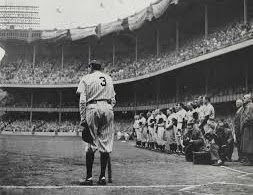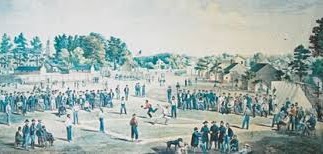
Vintage Baseball
There is a longing today in the hearts of many a baseball player to go back to playing ball the way it was played “when it was just a game.”
When we think of “the glory days” of baseball, most people think of Jolt’n Joe, The Splendid Splinter, and The Great Bambino. Indeed, the early part of the twentieth century was a time to remember, not only for baseball, but also for the Nation. Baseball has its way of telling our story like nothing else.

Baseball seems to have lost much of its following, however, in the past few decades, especially considering how the rise of over-commercialism, steroid use, and the television set have impacted the game.
In response, Vintage baseball leagues have sprung up at a feverish rate since the 1990’s, all in a quest to revisit our roots so as to find the essence of the game we love, the game we all long for. These leagues generally keep to the New York version of play, but according to the various rule sets written in various years according as the game has developed over time, especially toward the middle and end of the nineteenth century. Attempts are made to reconstruct these old games in exact detail, from the clothing worn by the umpire, to the banter spewed on the field.

Some, to be sure, dig deeper into our roots, to the more seemingly exotic versions played in Philadelphia, in Massachusetts, Ohio and other states in the nineteenth century before the civil war. In this “former” golden era of base ball, the game was evolving at a rapid pace. Baseball was then a product of a free-flowing process of trial-and-error of various rules that could change on a whim, so long as the players from both teams agreed that it was for the betterment of those involved in the immediate experience.
Indeed, it was a very mid-nineteenth century phenomenon to invent new games. It was a time when leisure was permitted. It was a time when a daily diversion was welcomed as our country was pushed further toward the brink of war. It was a time when the spirit of adventure and exploration was defining what it really meant to be American.
But with the passing of the civil war, many returned to baseball in an attempt to put aside our differences, and to redefine what it meant to be united as a nation. And it was in the spirit of this unity that the nation, forsaking all others, rallied around The New York Game and elevated it into what we now refer to as Our National Pastime. But as a result of this step toward healing, we left behind an array of bat-and-ball games that until that time were legitimate contenders as our National Game. Thus “vintage” enthusiasts today who look no further than the New York Style of play forget the deeper roots from whence our national game emerged.

We had asked earlier what the Massachusetts Game would have looked like today if it had won out over The New York Game as The National Pastime
What if we asked the same question, but the other way around? What if the twenty-first century version of The Massachusetts Game had happened upon the ballists of the mid-nineteenth century at the peak of the exploration era in which our National Pastime finds its inception? Would they have embraced it? Or would they have dismissed it on account of it not being “of their time?”
Twenty-First Century Townball has a vintage flair to be sure. However, the vintage purists who will only embrace a game because it is found in the past in its exact form are missing the real spirit of the era to which they strive to return. The spirit of vintage baseball is not about strictly adhering to a rule set solely because of the date of its invention. Rather, the spirit of vintage baseball, indeed the spirit of the nineteenth century, is about finding a game that really plays.
Twenty-First Century Townball embodies everything about base ball that was alive with real sport in “the former glory days” of baseball. Moreover, this game lives up to it’s name. It is a version of town ball for today, and yet finds it’s roots in the past.
Indeed, for those of us who play this game, we all feel that we are a part of something bigger. Something simultaneously past and present. Something that keeps us coming back for more.
Those of us that play Twenty-First Century Townball feel that we are not only playing a great game, but we are playing this great game now, when it is just a game.